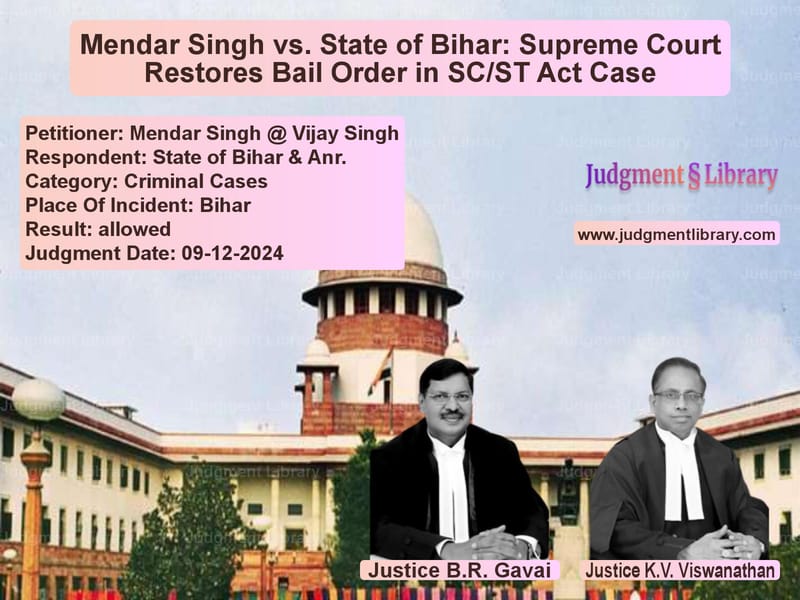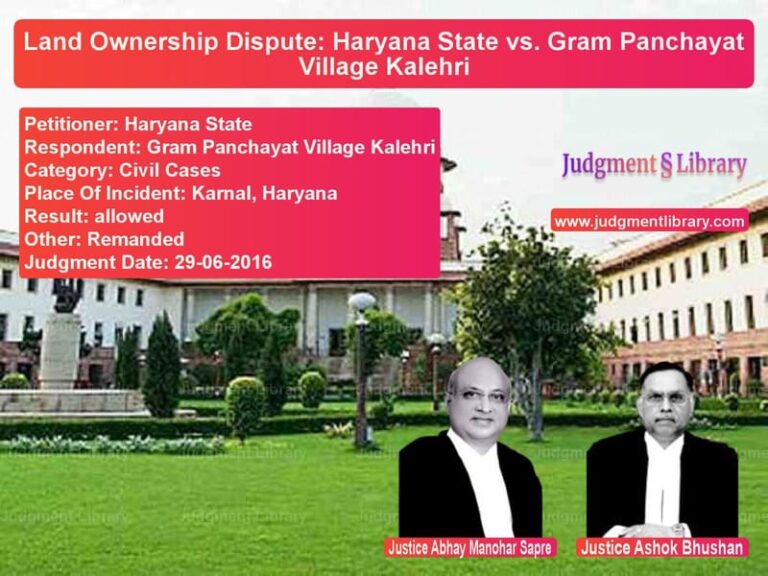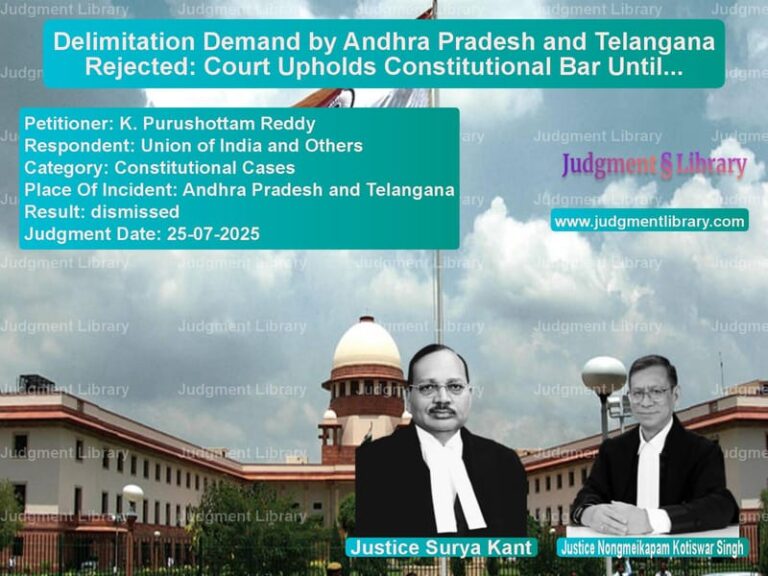Mendar Singh vs. State of Bihar: Supreme Court Restores Bail Order in SC/ST Act Case
The case of Mendar Singh @ Vijay Singh vs. State of Bihar & Anr. is a landmark judgment that delves into the nuances of bail jurisprudence, particularly in cases falling under the Scheduled Castes and the Scheduled Tribes (Prevention of Atrocities) Act, 1989. This case raises significant legal questions about the authority of the High Court to recall its own bail order based on an inquiry conducted after granting bail. The ruling by the Supreme Court provides clarity on the limits of judicial power in such matters and sets an important precedent.
Background of the Case
The case originated with an FIR lodged against Mendar Singh on July 9, 2016. The charges framed against him included Sections 302 and 34 of the Indian Penal Code (IPC), Section 27 of the Arms Act, and Section 3(2)(v) of the SC/ST Act. The allegations involved a murder case in which the complainant, belonging to a Scheduled Caste community, accused the petitioner and his associates of conspiring and executing the crime.
Following his arrest, the petitioner moved for bail, which was initially denied by the Sessions Court on July 5, 2022. Consequently, the petitioner approached the Patna High Court, filing an appeal under Section 14A(2) of the SC/ST Act, arguing that he was being falsely implicated and that there was no substantial evidence against him.
Grant of Bail by the High Court
On December 8, 2022, after a detailed examination of the case, the High Court granted bail to the petitioner. The court observed that the petitioner had made a prima facie case for bail and that the prosecution had failed to demonstrate sufficient grounds for denying bail under the stringent provisions of the SC/ST Act.
“After considering the material on record, this court finds that the petitioner is entitled to the relief of bail, subject to stringent conditions to ensure that he does not misuse the liberty granted to him.”
The bail was granted under specific conditions, including:
- The petitioner was not to tamper with evidence.
- He was required to refrain from influencing witnesses.
- He had to report to the police station periodically.
High Court’s Recall of Bail Order
Subsequent to the bail order, the complainant filed an application seeking modification of the bail order, contending that the petitioner had a criminal record and had suppressed material facts while applying for bail. While rejecting the modification request, the High Court directed the Registrar General to conduct an inquiry into the petitioner’s past criminal record.
On August 25, 2023, based on the findings of this inquiry, the High Court recalled its own bail order, reasoning that the petitioner had not disclosed his criminal antecedents at the time of seeking bail.
“It has come to light that the petitioner has criminal antecedents, which were not disclosed at the time of seeking bail. In view of this concealment, the order granting bail stands recalled, and the appeal is dismissed as withdrawn.”
Supreme Court’s Ruling
The petitioner challenged the recall order before the Supreme Court, arguing that the High Court had exceeded its jurisdiction in recalling a bail order after it had been granted. The case raised crucial legal questions about the nature of judicial discretion in bail matters and the principles governing recall of bail orders.
Arguments by the Petitioner
- The petitioner argued that he had no intention to suppress facts and that all relevant information was already part of the records.
- It was contended that the recall of bail was improper as there were no allegations of misuse of bail conditions.
- Once bail is granted, it can only be canceled by the competent court based on violations, and not through a recall order issued by the same court.
Arguments by the Respondents
- The State argued that the petitioner had a history of criminal cases and had failed to disclose them at the time of seeking bail.
- The respondents contended that the High Court had the inherent power to review its own orders in the interest of justice.
- It was asserted that the grant of bail was based on incorrect information, thereby justifying its cancellation.
Supreme Court’s Analysis
The Supreme Court examined whether the High Court had the authority to recall a bail order on the basis of a subsequent inquiry. The Court ruled that once bail is granted, it can only be canceled under specific circumstances, such as violation of bail conditions or fresh evidence proving the accused’s involvement in further offenses.
“Since there was not even an allegation by the Investigating Agency that the appellant has violated any of the conditions which were imposed while granting bail or that he was misusing the liberty granted to him, it was not correct on the part of the learned Single Judge to recall its earlier order granting bail.”
The Supreme Court made the following observations:
- The High Court did not have the power to recall a bail order in this manner.
- The conditions for cancellation of bail were not met in this case.
- The recall of bail, based solely on a subsequent inquiry, was legally unsustainable.
Final Judgment
The Supreme Court set aside the orders dated February 15, 2023, and August 25, 2023, and restored the original bail order dated December 8, 2022. The judgment concluded:
“The High Court exceeded its jurisdiction in recalling the bail order. The conditions for the cancellation of bail are well established, and none of those conditions were met in this case.”
Accordingly, the appeal was allowed, and the petitioner remained on bail.
Implications of the Judgment
This judgment has significant implications for bail jurisprudence, particularly under the SC/ST Act:
- Limits on High Court’s Power: The ruling clarifies that High Courts cannot recall bail orders merely based on inquiries conducted post-grant of bail.
- Protection of Bail Rights: The judgment ensures that once bail is granted, it cannot be withdrawn arbitrarily.
- Adherence to Due Process: The decision reinforces the principle that bail can only be canceled under legally established criteria.
The case sets a strong precedent against the arbitrary recall of bail orders and ensures that the grant of bail remains a well-defined judicial process.
Petitioner Name: Mendar Singh @ Vijay Singh.Respondent Name: State of Bihar & Anr..Judgment By: Justice B.R. Gavai, Justice K.V. Viswanathan.Place Of Incident: Bihar.Judgment Date: 09-12-2024.
Don’t miss out on the full details! Download the complete judgment in PDF format below and gain valuable insights instantly!
Download Judgment: mendar-singh-@-vijay-vs-state-of-bihar-&-anr-supreme-court-of-india-judgment-dated-09-12-2024.pdf
Directly Download Judgment: Directly download this Judgment
See all petitions in Bail and Anticipatory Bail
See all petitions in SC/ST Act Case
See all petitions in Judgment by B R Gavai
See all petitions in Judgment by K.V. Viswanathan
See all petitions in allowed
See all petitions in supreme court of India judgments December 2024
See all petitions in 2024 judgments
See all posts in Criminal Cases Category
See all allowed petitions in Criminal Cases Category
See all Dismissed petitions in Criminal Cases Category
See all partially allowed petitions in Criminal Cases Category






